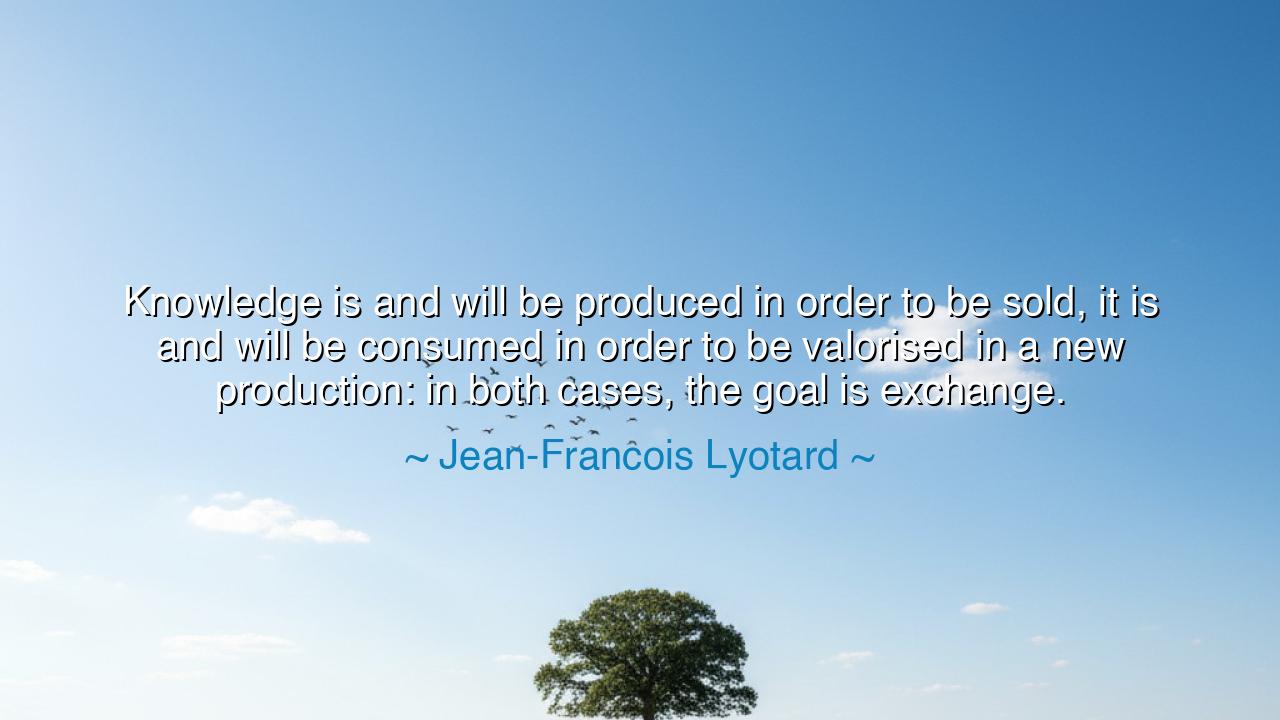
Knowledge is and will be produced in order to be sold, it is and
Knowledge is and will be produced in order to be sold, it is and will be consumed in order to be valorised in a new production: in both cases, the goal is exchange.






Hear, O seekers of truth, the words of Jean-François Lyotard, philosopher of the postmodern age, who declared: “Knowledge is and will be produced in order to be sold, it is and will be consumed in order to be valorised in a new production: in both cases, the goal is exchange.” This saying is not light, but heavy as iron, for it unmasks the fate of knowledge in a world governed by markets. Lyotard, with the gaze of a prophet, saw that in modern times, truth itself had become a commodity, measured not by its wisdom or virtue, but by its price and its usefulness in cycles of profit.
The origin of this utterance lies in Lyotard’s work The Postmodern Condition, where he examined the role of knowledge in an age dominated by technology, capitalism, and power. Once, knowledge was pursued for wisdom, for the soul’s enlargement, or for the glory of truth itself. But in the postmodern order, he observed, it is increasingly produced for sale, wrapped in patents, textbooks, technologies, and data. It is consumed not to elevate the spirit, but to fuel further production, innovation, and economic gain. In such a cycle, knowledge is stripped of innocence; it becomes a tool, its purpose bent toward exchange.
Consider, O listener, the tale of the printing press. When Gutenberg first unleashed his invention, books, once treasures of monasteries, became goods of the marketplace. The Bible, poetry, and philosophy spread like fire—but so too did the commodification of knowledge. From that moment, truth itself was no longer a sacred treasure guarded by scribes, but a product, bought and sold. In this, we see Lyotard’s words foreshadowed: knowledge was already becoming entangled in the chains of exchange.
Or reflect upon our own age, where corporations hoard scientific discoveries behind paywalls, where universities measure their worth in grants won and patents filed, where even the mysteries of DNA and the code of the human spirit are patented and sold. Knowledge flows ceaselessly, but its flow is no longer free—it is governed by the currents of markets, consumed not as wisdom but as resource. Here, Lyotard’s prophecy is made flesh: truth itself enters the marketplace as product.
Yet we must not hear his words as despair only, but as a call to vigilance. For even within systems of exchange, the soul may still seek higher ends. Knowledge may be produced for sale, yes, but the wise can still pursue it for virtue, for justice, for beauty. It is not the commodification itself that damns us, but the forgetting of knowledge’s nobler purposes. The danger is not that knowledge circulates as currency, but that men and women cease to ask: For what do we seek this? For whom is it to be used?
The lesson is clear: if you would walk the path of wisdom, be mindful of how knowledge is used and shared. Do not despise the systems of exchange, for they are now part of the age we live in, but do not be enslaved by them. Seek knowledge not only for gain, but for the service of others, for the elevation of the spirit, for the pursuit of justice. Let your heart remember that the value of truth is not only in its price, but in its power to shape souls and nations.
Practical actions lie close at hand. Share freely what you can; mentor others without thought of profit; defend open access to learning when possible. If you work in the production of knowledge, do so with conscience—ask who benefits, who is excluded, and how justice might be served. Let your exchange be not only in markets, but in communities of friendship, teaching, and love. In this way, you redeem knowledge from being only a commodity, and restore it also as a gift.
So remember Lyotard’s words: knowledge in this age is bound to exchange, yet the soul can still choose how to shape that exchange. Whether it becomes a chain that enslaves or a river that nourishes depends on the heart of the seeker. Therefore, be not only a buyer or seller of knowledge, but a steward of wisdom, so that truth, though entangled in commerce, may still shine as light upon the world.






AAdministratorAdministrator
Welcome, honored guests. Please leave a comment, we will respond soon